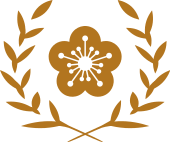President of the Republic of China (Taiwan)
| President of the Republic of China (Taiwan) | |

|
|
| Standard of the President | |

|
|
| President's emblem | |

|
|
|
Acting President Tsai Ing-wen since May 20, 2016 |
|
| Official seat | President's Office in Zhongzheng District, Taipei |
| Term of office | four years (re-election possible once) |
| Creation of office | December 25, 1947 |
| Last choice | January 11, 2020 |
| Deputy | Vice President |
| website | english.president.gov.tw/ (en) |

The President of the Republic of China ( Chinese 中華民國 總統 / 中华民国 总统 , Pinyin Zhōnghuá Mínguó Zǒngtǒng , W.-G. Chung-Hwa Ming-Kuo Tsung-T'ung ) is the head of state and commander in chief of the armed forces of the Republic of China , their controlled national territory since the loss of mainland China in 1949 has been limited to Taiwan and a few smaller islands including Penghu , Kinmen and Matsu . Informally, the President of the Republic of China is therefore also known as the " President of Taiwan " ( Chinese 臺灣 總統 , Pinyin Táiwān Zǒngtǒng ).
The office of president was established in 1948 under the 1947 constitution. Initially, the President was elected by the National Assembly. Since 1996 he has been elected directly by the people for four years at a time using the majority voting principle with a simple majority. The term of office is limited to two terms, i.e. eight years.
Constitutional Powers
The constitution of the Republic of China in Taiwan largely corresponds to a presidential system of government , analogous to that of the United States . The President of the Republic appoints the President of the Executive Yuans ("Prime Minister") who runs the business of government. In the past it was therefore the case that the major political guidelines were indirectly dictated by the President. The President of the Republic has the power to carry out diplomatic actions such as signing treaties with other states or declaring war and making peace. He awards medals and honors and has the right to pronounce pardons and amnesties. The president has the supreme command of the armed forces and the authority to impose martial law on the country. He has no right of veto over the laws of the parliament ( Legislative Yuan ), and the Legislative Yuan can demand the repeal of martial law by resolution. In the event of an emergency, such as a natural disaster, the president can issue emergency ordinances. However, these must be confirmed by the legislative yuan within one month and otherwise lose their validity.
The original version of the 1947 constitution imposed a term limit on the president. The term of office was 6 years and he could only be re-elected once. This regulation was lifted in 1960 to allow Chiang Kai-shek to be re-elected. In fact, Chiang Kai-shek then held the post of President from 1947 until his death in 1975 with short interruptions. Originally, the President was elected indirectly by the National Assembly. This was changed by a constitutional amendment in 1991, so that since then the president has been elected by direct election for a term of office of 4 years (Amendment 2 to the Constitution). The limitation of the term of office was reintroduced, so that only one re-election is allowed. The first direct election took place in 1996 . In the case of direct voting, there is only one ballot and the candidate with the most votes wins the election. This can mean that candidates are only successful with a relative majority of votes. Sun won Chen Shui-bian , the presidential election in 2000 with only 39.3% of the vote.
In the event that the President can no longer continue his official duties, Article 49 of the Constitution provides for the following: First, the Vice President succeeds in office, who is in office until the end of the legislative period. Should the Vice-President not be able to do so either, the Prime Minister takes over the office (maximum 3 months) and the Parliament elects a new successor, who then holds the office until the end of the term of office.
The president can be removed from office by a two-thirds majority in parliament. The impeachment must be confirmed by the voters with an absolute majority, with a voter turnout of at least 50%. The President enjoys indemnity from prosecution. Only cases of high treason or breach of the constitution are excluded (in Article 52 of the constitution: "rebellion" ). Persons aged 40 and over are eligible for the office of President.
See also
- List of Presidents of the Republic of China (Taiwan)
- Empire of China (heads of state until 1912)
- List of Presidents of the People's Republic of China (heads of state from 1949)
- Prime Minister of the Republic of China (Taiwan)
Web links
Individual evidence
- ↑ a b c Chapter IV. The President. Taiwan Presidential Office, accessed on November 26, 2016 (English, text of the constitution including additional articles).
- ^ A b Additional Articles of the Constitution of the Republic of China (Taiwan). Taiwan Presidential Office, accessed November 26, 2016 .
